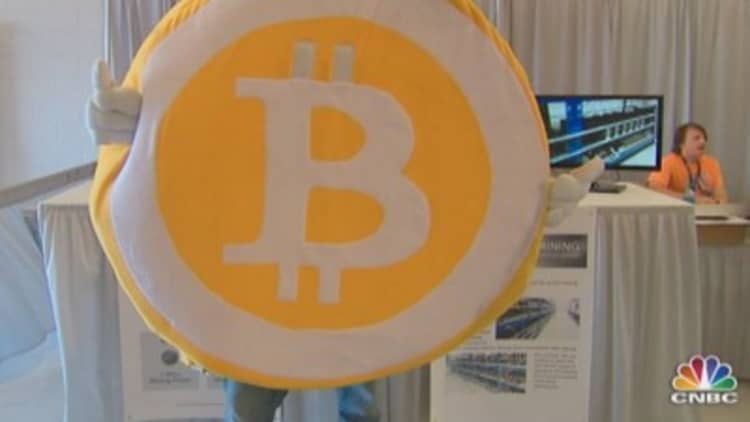
The Monday night meetings at New York City's Bitcoin Center hardly seem the stuff of a revolution.
Wielding smartphones and computers, the mostly male, mostly under-30 revolutionaries stand in the middle of a cavernous space in the shadow of the New York Stock Exchange. Their mission is to spread the gospel of bitcoin, which they believe has the power to upend the global financial system.
"There are an increasing number of people who recognize the potential of the platform," said Miles Cowan, a former lawyer and a recent convert to the bitcoin movement.
The platform is the brainchild of an unknown person or group called Satoshi Nakamoto. In the last year, bitcoin has grabbed headlines as much for the meteoric rise in its price as for its link to the shadowy underworld of cybercrime.
Click here for the full documentary of "The Bitcoin Uprising"
It has been hailed by Silicon Valley's wise man Marc Andreessen and has been criticized by billionaire investor Warren Buffett. The views of global regulators are split as well. Japan, for example, will not recognize it while Brazil does.
Read MoreBitcoin's Mt. Gox files for liquidation: Report
A mere 6 years old, the digital currency is being pushed and prodded forward by a zealous group of believers who maintain that bitcoin doubters are blind to what it can do, while its critics doubt bitcoin can deliver on its promises.
Read MoreWhy Warren Buffett's wrong on bitcoin: Bill Miller
"This is a competitive currency, competitive store of value that might just have great benefits for the world," said Jim Harper, the global policy counsel for the advocacy group, the Bitcoin Foundation. "Around the world, billions of people—literally, billions of people—don't have access to financial services. Bitcoin can create opportunities for them to save, to accumulate wealth and better their lives."
As a digital currency, bitcoin is created and stored online, on a mobile phone or computer. You cannot hold it in your hand. Creators, called miners, produce bitcoins every 10 minutes by solving complex math problems. Miners control supply, which is limited to 21 million bitcoins—about half of which have been mined already.
Read MoreBitcoin defies talk of China crackdown
Once they are mined, bitcoins can be sent instantly around the world from one digital wallet to another. These transactions can be nearly anonymous. As bitcoin moves between digital wallets, the transactions are posted and then verified on a public open-source ledger called a block chain, with each transaction identified by a unique string of numbers and letters. Nothing links the transaction to the names or addresses of the sender and receiver.
Cheap money transfers, anonymity and lack of government regulation or oversight from a central bank are all hallmarks of bitcoin. Those hallmarks, which have attracted an ardent following among libertarians, pose problems for the other set of bitcoin advocates.
Bitcoin entrepreneurs find the lack of regulation can be a hindrance to opening a business and attracting customers. Bitcoin's near anonymity attracts a criminal element looking to conduct business with a currency that is almost untraceable. While its current core function of speedy, cheap money transfers sounds good, it is done in a system that is not always secure. Digital wallets and bitcoin exchanges where the digital currency is stored can easily be hacked, and bitcoins can be and are stolen.
"The advocates think that regular people should adopt it," said Justin Wolfers, an economist at the Brookings Institute. "I don't see any need to. I walk into the stores, the stores accept my U.S. dollars. The monetary system's working perfectly OK for me right now."
Read MoreTo save bitcoin, regulation is key first step
Wolfers believes that because bitcoin is inconvenient to use, it will probably not achieve the widespread adoption it needs to become a parallel or replacement for fiat currencies around the world.
Advocates, including 26-year-old Jonathan Rumion, disagree.
The resident of Austin, Texas, is a bitcoin investor and software developer for a bitcoin start-up. He gets paid in bitcoins and except for rent and gas, pays for most of his living expenses using dollar-denominated gift cards he bought with bitcoin.
"I can't claim bitcoin is this new big thing if I'm not willing to take the risk myself," Rumion said.
Read MoreDisappearing bitcoins? There's insurance for that
It's a risk that has paid off for the computer whiz kid who finished college when he was in his teens. He has made a lot of money, in a short time, trading the cryptocurrency.
"I think my best earning was $1,000 over 10 minutes, " he said. "Just on a quick trade and a phone call."
In 2013 bitcoin rose 5,248 percent, hitting an all-time high of $1,126.82. Since then it's dropped to around $430.
The slide in price has not deterred a growing number of retailers from accepting bitcoin payments for their services, including notable firms like Cheapair.com and Overstock.com. Regulators, too, continue to examine it though opinions vary around the world about its usefulness and viability.
The bitcoin faithful, though, have no doubt. Bitcoin, they say, is here to stay.
—By CNBC's Mary Thompson.


